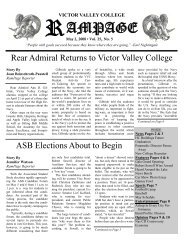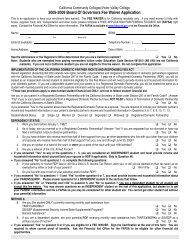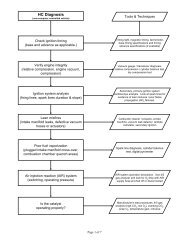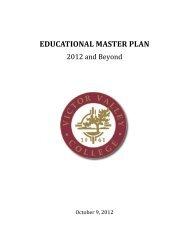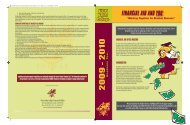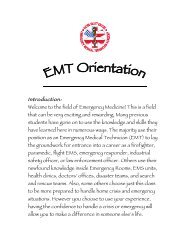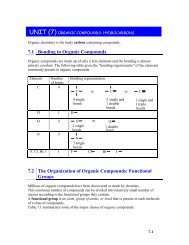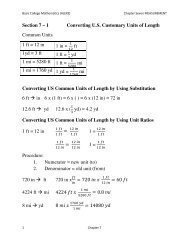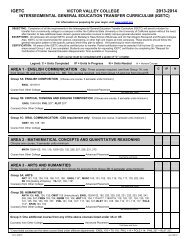Download - Victor Valley College
Download - Victor Valley College
Download - Victor Valley College
Create successful ePaper yourself
Turn your PDF publications into a flip-book with our unique Google optimized e-Paper software.
FINANCING YOUR EDUCATION<br />
TYPES OF FINANCIAL AID<br />
INVESTING IN YOUR EDUCATION<br />
A college education is one of the best investments in the<br />
future that many students will make. Some experts say a<br />
college degree has the potential of adding hundreds of<br />
thousands of dollars to an individual’s lifetime earnings.<br />
In a world that is daily becoming more complex, more<br />
and more occupations require specialized training and<br />
educational and learning skills.<br />
As with any investment, there are financial considerations<br />
in earning a college degree.<br />
VVC offers a number of financial aid programs,<br />
scholarships, special awards, and work-study programs<br />
to help students finance their educations.<br />
Eligibility and Qualifications<br />
Each financial aid program has specific requirements.<br />
However, the programs described in this section of the<br />
catalog share the following eligibility criteria:<br />
• U.S. citizenship or permanent resident visa.<br />
• Enrollment in courses in accordance with the VVC<br />
Educational Program Plan and regular attendance in<br />
VVC classes.<br />
• Satisfactory academic progress (financial aid<br />
satisfactory progress policy will be given to you during<br />
the initial financial aid counseling).<br />
• Financial need as determined by the information<br />
listed in the Free Application For Federal Student Aid<br />
(FAFSA).<br />
• Ability to Benefit, or high school diploma.<br />
Financial Aid<br />
The Financial Aid Office assists students who are<br />
seeking financial help to pay for the costs of attending<br />
<strong>Victor</strong> <strong>Valley</strong> <strong>College</strong>. Money may be provided to cover<br />
the cost of tuition and/or enrollment fees, books,<br />
transportation, and partial living expenses. Students may<br />
be working and still qualify to receive financial aid. Visit<br />
www.fafsa.ed.gov for the FAFSA application. Applying<br />
on time is critical.<br />
You may begin the FAFSA application process any time<br />
after January 1 for the upcoming year.<br />
The processor will forward the Student Aid Report (SAR)<br />
to the student. Additional documentation may be<br />
required to support the data submitted on the application.<br />
It is important that all requested documentation be<br />
returned as soon as possible.<br />
Financial Aid awards are not made until a student’s file is<br />
complete.<br />
The Financial Aid Office is available to help with the<br />
process. Students may find applying for aid difficult and<br />
confusing. Those needing help or advice are encouraged<br />
to contact the Financial Aid Office (760) 245-4271,<br />
extension 2277 or visit us on the Web at www.vvc.edu.<br />
We offer workshops to assist you.<br />
TYPES OF FINANCIAL AID<br />
Board of Governors Fee Waiver<br />
This waiver is available to residents of California to cover<br />
the additional cost due to fees initiated on July 1, 1985.<br />
Students must demonstrate financial need and complete<br />
the FAFSA or Board of Governors Fee Waiver<br />
Application. The maximum waiver covers the community<br />
college enrollment fee and discounted parking.<br />
State Grants<br />
California, through the Student Aid Commission, offers<br />
state-funded grants for undergraduate students. There<br />
are grants for both academic and vocational higher<br />
education programs, including the new entitlement<br />
program.<br />
Cal Grant A, B or C applicants must have financial<br />
need, be legal California residents attending an eligible<br />
school in California, be in a program of study leading<br />
directly to an undergraduate degree or certificate, be<br />
enrolled at least half-time and not possess a<br />
baccalaureate degree prior to receiving an award. A<br />
student can accept only one Cal Grant. The Financial Aid<br />
Office has complete Cal Grant eligibility and application<br />
information.<br />
Cal Grant A helps students with tuition/fee costs. The<br />
minimum eligible course length is two academic years<br />
and is held in a reserve status at the community college<br />
level.<br />
Cal Grant B provides a living allowance for very lowincome<br />
students. More than half of all new Cal Grant B<br />
recipients begin at a public community college. The Cal<br />
Grant B award for freshmen is usually limited to the<br />
nontuition costs of attending college such as living<br />
expenses, books and supplies, transportation, etc. When<br />
renewed by sophomores and above, a Cal Grant B may<br />
also cover all or part of tuition/fee costs. The minimum<br />
eligible course length is 12 months.<br />
Cal Grant C helps vocational education students with<br />
tuition and training costs. Recipients must be enrolled in<br />
a vocational program at a community or independent<br />
college or a vocational school course of study from 4 to<br />
24 months in length.<br />
How to Apply for State Grants<br />
To apply for a Cal Grant, complete the Free Application<br />
for Federal Student Aid (FAFSA) and file it between<br />
January 1 and the Cal Grant March 2 deadlines. Also<br />
56 2012-2013 <strong>Victor</strong> <strong>Valley</strong> <strong>College</strong> Catalog



